5 Surprising Places Rattlesnakes Like to Hide Around Your Home
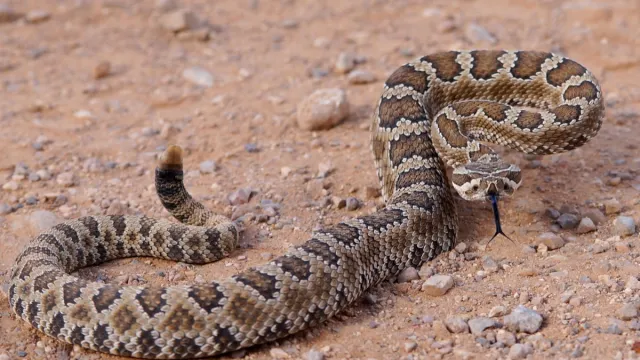
Snake season doesn’t start in earnest until the springtime, but this year saw its first rattlesnake bite occur before February even ended. Experts warn that above-average temperatures are bringing the reptiles out earlier, which means you’ll want to start being extra aware of your surroundings—and this includes the areas near where you live. To keep you safe, we spoke to experts to find out the surprising spots these slippery serpents like to hide around your home.
RELATED: Top 10 Things Attracting Snakes to Your Home.
1
In crawl spaces
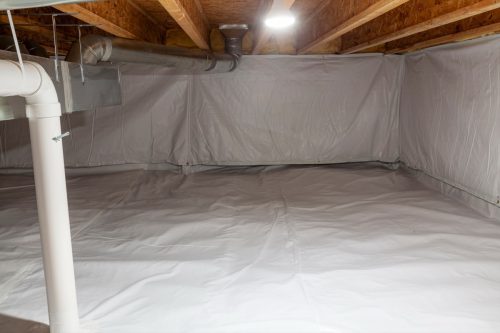
While it’s not likely you’ll find rattlesnakes in your home, Charles van Rees, conservation scientist and editor-in-chief of Gulo in Nature, says if you do see them, it may be in small and cramped areas like crawl spaces.
“Snakes generally live a pretty low-key lifestyle, and with the exception of the breeding season, they will typically be either hunting for food, looking for a place to warm up and increase their body temperature, or looking for a safe place to rest,” explains van Rees, who says crawl spaces are ideal locations for rattlesnakes to hide out.
2
Behind appliances

Another area where rattlesnakes may be hiding is around your appliances or electronics “to look for warmth,” says Brad Woods, district manager at Trutech Wildlife Services. He adds that the space behind TVs, dishwashers, refrigerators, and water heaters are prime spots.
To prevent rattlesnakes from getting into your home in the first place, Marvin Magusara, co-founder of Retaining Wall Supplies, suggests “sealing any gaps or holes in your home’s foundation, walls, and around doors that might welcome a snake.”
RELATED: 6 Top Signs There Are Snakes in Your Yard.
3
In yard debris
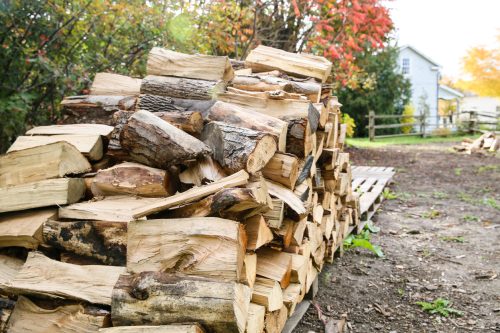
Your yard also offers plenty of hiding spots for rattlesnakes.
Meg Pearson, training manager at Critter Control, says you’ll typically find them “in warm areas like inside garages, within piles of firewood, [or by] garbage bins.”
The easiest way to keep your yard rattlesnake-free is to ensure it’s tidy. “Keeping the grass cut and clearing your yard of any debris (sticks, woodpiles, leaves, and other build-up)” is a good first step, says Pearson. She adds that since rattlesnakes prefer to remain unseen, “if your lawn doesn’t provide them any visual cover, they’re likely to move on from it quickly.”
4
Under a porch or deck
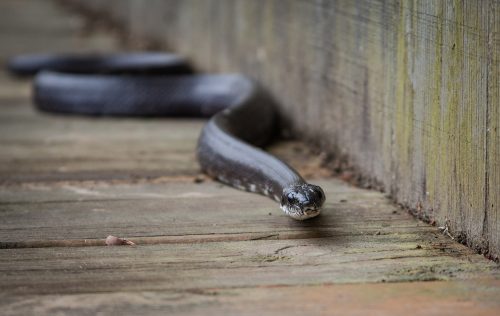
Though they look for warmth in colder months, rattlesnakes will seek out shady places to hide from the sun when it gets warm.
“Some unbelievable concealment spots are right under your porch or deck because it is cooler there, darker and quieter,” explains Magasura.
These areas also tend to be harboring insects or rodents, which are food for rattlesnakes. “Rattlesnakes hunt by ambushing their prey. That means they need to be where the most activity is,” explains Woods.
Since rodents usually nest in the spring, you may see more of them, as well as rattlesnakes, during that time.
RELATED: Rattlesnake Attack Has Trauma Doctor Issuing a New Warning.
5
In the garage
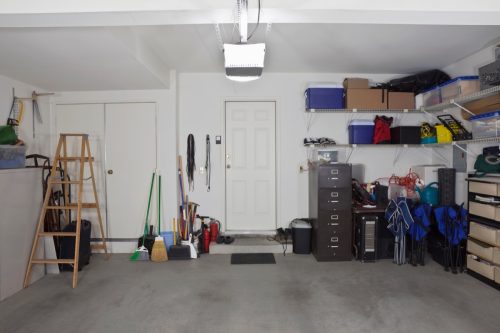
Experts agree that there’s a higher chance of finding rattlesnakes in your garage than anywhere else.
“You’re much more likely to run into a snake of any kind in a shed or garage, where they might have easier access,” says van Rees. Again, these spots provide protection, warmth or shade, and possibly food.
Pearson adds that rattlesnakes often slip into the garage because they can get through small cracks and holes in your home’s foundation. “If you do find a rattlesnake in your home, you should move away from the area where the snake is and call a professional wildlife removal service,” she says.